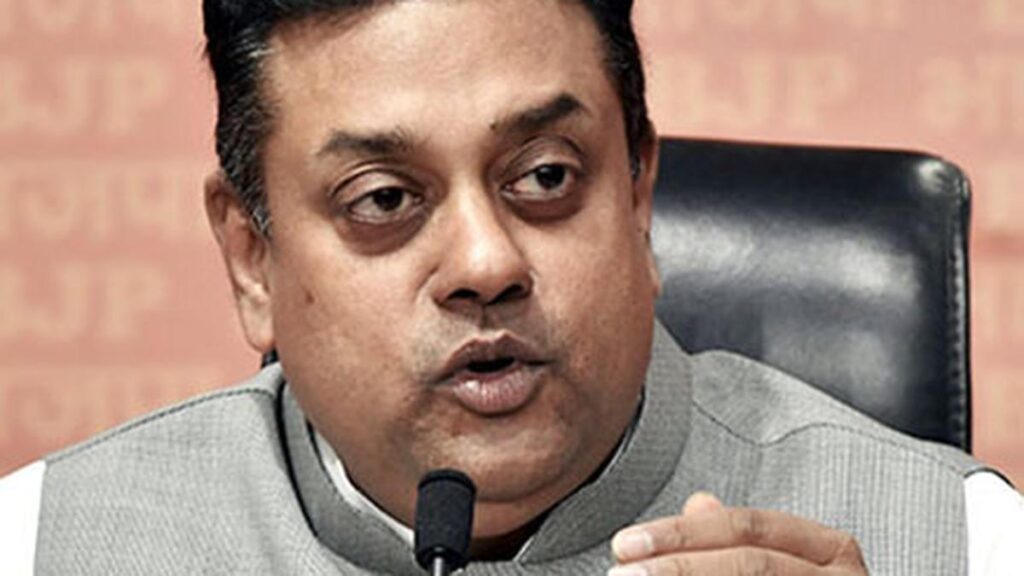
NEW DELHI, 28/01/2023: National spokesperson of the Bharatiya Janata Party, Sambit Patra addressing a press conference at the BJP HQ, in Delhi on Saturday, January 28, 2023. Photo: SHIV KUMAR PUSHPAKAR / The Hindu
| Photo Credit: SHIV KUMAR PUSHPAKAR
A report by Jawaharlal Nehru University (JNU) on an ongoing research project — ‘Illegal Immigrants to Delhi: Analysing Socio-Economic and Political Consequences’ — came under the scanner on Monday after BJP’s national spokesperson Sambit Patra cited the document to allege that illegal immigrants in Delhi are “thriving under the patronage of AAP”.
Some JNU professors, however, have said the report is “methodologically compromised” and is “clearly targeted at the Delhi government ahead of the election”. Surajit Mazumdar, a professor at the School of Social Sciences, said, “It is uncommon for the university to lend its name to a research project. How does one identify an illegal immigrant unless you are starting with the assumption that all Muslims are illegal immigrants?”
While the report comes two days before the polling, the BJP and AAP have, during their campaigns, pointed fingers at each other for “settling illegal immigrants” in the city.
Claiming that Bangladeshis have taken over the jobs meant for Purvanchalis, Mr. Patra said, “Behind all this is political protection, particularly from AAP and the Congress.”
JNU Vice-Chancellor, Santishree Dhulipudi Pandit said that the project was done as an Indian Council of Social Science Research (ICSSR) project by a team of scholars from JNU and TISS. The first page, however, says that the report is “presented” by JNU. ICSSR is the apex body of the Government of India for research in the social and human sciences, and comes under the aegis of the Ministry of Education.
The principal investigator, Professor Manuradha Chaudhary, is also the Dean of Students in JNU and teaches at the Centre of Russian Studies. The co-principal investigator, Professor Preeti D. Das, teaches at the Centre for Russian and Central Asian Studies, School of International Studies. Souvik Mondal from TISS is serving as a knowledge partner. Some students also had roles in the project as research associates and field investigators.
While the authors did not respond to The Hindu, an official source said that the report was released mid-way because as practise, ICSSR reports are released in regular intervals, even prior to completion. There are nine months before the report is completed.
Key findings
A press release issued by the professors working on the project stated that with the intention of verifying whether Delhi State govt. is “unique in giving incentives to Rohingyas and illegal immigrants”. It said that key areas were affected are domestic work, services and unskilled jobs “where the Indian citizens are affected”.
It added that in many “illegal pockets” people have received State benefits such as water and Aadhaar cards. It said, “most of the fraudulent cards have been made not only in West Bengal, Assam, and Jharkhand but also in Delhi”.
In conclusion, it states that the issue of illegal immigration is “worrying for locals” also looking for jobs and are “denied this by these illegal immigrants, who have better networks.” It further adds they are “more violent than locals”.
‘Academically compromised’
The report uses a mixed method design with “a target sample of 400 individuals which was successfully surveyed from various clusters within Delhi”. It also conducts key informant interviews with community leaders, government officials, brokers and contractors.
Moushumi Basu, JNUTA President, however, criticised the approach calling it “compromised” saying, “How does one identify who is an illegal immigrant?” She added, “They (administration) are increasingly getting students to work on themes preferred by the ruling dispensation.” She points out that a similar study on illegal immigrants in Mumbai by academic from TISS, also involved in this project, was released prior to Maharashtra elections. At the time, the report drew flak from the academic community.
Surajit Mazumdar, a professor at the School of Social Sciences, said that it is uncommon for the university to “lend their name to a research project”. He added, “How does one identify an illegal immigrant unless you’re starting with the assumption that all Muslims are illegal immigrants.”
The study, in fact, says that 96.3% of their respondents identified as Muslim. Hotspots identified for the report included Jafrabad, Shahdara, Seelampur, Jamia Nagar, Zakir Nagar among others. The press release also noted that illegal immigrants are “difficult to recognise because of their physical features and language”.
It further states, “The increase in the migrant population has changed the religious and cultural composition of some parts of Delhi. This has sometimes led to social tensions and conflicts, as cultural differences can create misunderstandings between local communities and migrants.”
Published – February 04, 2025 01:58 am IST
Source:https://www.thehindu.com/news/cities/Delhi/bjp-cites-jnu-research-report-as-proof-of-aap-settling-immigrants/article69177506.ece

